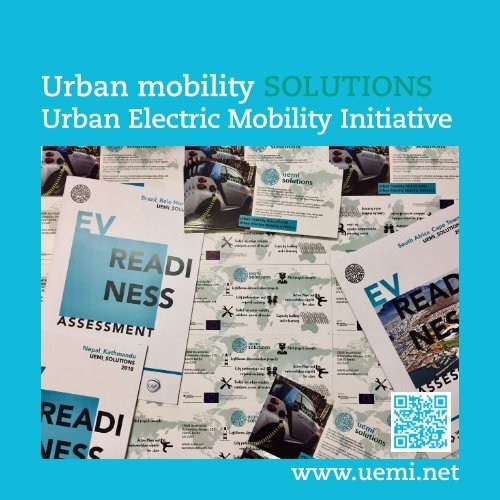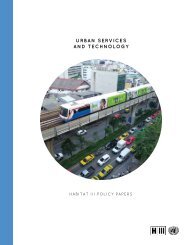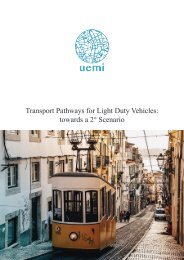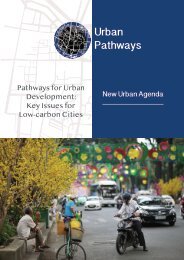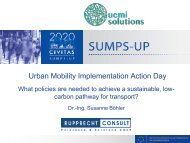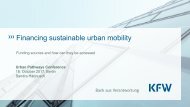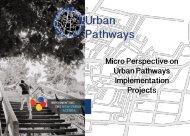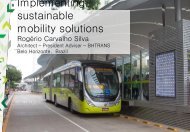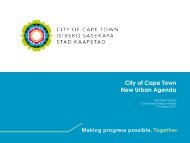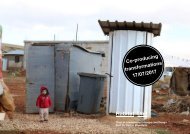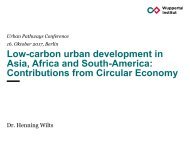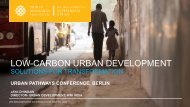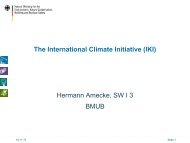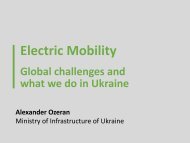UEMI_COP24
You also want an ePaper? Increase the reach of your titles
YUMPU automatically turns print PDFs into web optimized ePapers that Google loves.
Urban mobility SOLUTIONS<br />
Urban Electric Mobility Initiative<br />
www.uemi.net
Partnerships<br />
Partners of the SOLUTIONS network, <strong>UEMI</strong> and Future Radar project<br />
2
Who we are<br />
Moving without emissions<br />
Urban Electric Mobility Initiative (<strong>UEMI</strong>)<br />
The Urban Electric Mobility Initiative (<strong>UEMI</strong>) aims to help phasing out conventionally fuelled<br />
vehicles and increase the share of electric vehicles (2-,3- and 4-wheelers) in the total volume<br />
of individual motorized transport in cities to at least 30% by 2030. The <strong>UEMI</strong> is an active<br />
partnership that aims to track international action in the area of electric mobility and aims<br />
to initiate local action. The <strong>UEMI</strong> delivers tools and guidelines, generates synergies between<br />
emobility programmes and supports local implementation action. <br />
The SOLUTIONS Network<br />
SOLUTIONS aims to support the exchange on innovative and green urban mobility solutions<br />
between cities from Europe, Africa, Asia and Latin America. The network builds on the SOLUTIONS<br />
project and brings together a wealth of experience and technical knowledge from international<br />
organisations, consultants, cities, and experts involved in transport issues and solutions.<br />
The overall objective is to make a substantial contribution to the uptake of innovative and<br />
green urban mobility solutions across the world by facilitating dialogue and exchange,<br />
promoting successful policy, providing guidance and tailored advice to city officials, and<br />
fostering future cooperation on research, development and innovation.<br />
3
Partner<br />
Projects<br />
Urban Pathways - Delivering on the New Urban Agenda<br />
The Urban Pathways project helps delivering on the Paris Agreement and the NDCs in the context of the<br />
New Urban Agenda and the Sustainable Development Goals. The project follows a structured approach to<br />
boost Low Carbon Plans for urban mobility, energy and waste management services, working on concrete<br />
steps towards a maximum impact in cities to global climate change mitigation efforts and sustainable and<br />
inclusive urban development.<br />
Future Radar<br />
Future Research, Advanced Development and Implementation Activities for Road Transport (FUTURE-RADAR)<br />
project will support the European Technology Platform ERTRAC (the European Road Transport Research<br />
Advisory Council) and the European Green Vehicle Initiative PPP to create and implement the needed<br />
research and innovation strategies for a sustainable and competitive European road transport system.<br />
Linking all relevant stakeholders FUTURE-RADAR will provide the consensus-based plans and roadmaps<br />
addressing the key societal, environmental, economic and technological challenges in areas such as road<br />
transport safety, urban mobility, long distance freight transport, automated road transport, global<br />
competitiveness and all issues related to energy and environment.<br />
4
City engagement<br />
Action Plans<br />
The SOLUTIONS project and the <strong>UEMI</strong> are working with cities on the implementation of<br />
sustainable urban mobility measures in the context of the New Urban Agenda. As part of<br />
urban implementation actions the team now works with cities to assess the opportunities<br />
for emobility concepts in their wider sustainable transport strategy. The current 25 cities<br />
engaged in the programme have a combined population of over 46 million people covering<br />
key emerging economies.<br />
Addis Abeba<br />
San Juan Compala<br />
Quito<br />
Kochi<br />
Kathmandu<br />
Shenzhen<br />
Tacloban<br />
Amman<br />
Kigali<br />
Belo Horizonte<br />
Montevideo<br />
Ibagué<br />
León<br />
Hanoi<br />
Kathmandu<br />
Bogor<br />
Pasig<br />
Melaka<br />
Cape Town<br />
Casablanca<br />
Suva<br />
Cairo<br />
Lusaka<br />
Accra<br />
Nairobi<br />
Warsaw<br />
Bremen<br />
Barcelona<br />
LaRochelle<br />
Budapest<br />
Kiew<br />
5
Pathways<br />
towards a 2.0DS and 1.5DS<br />
Example of Kochi - India<br />
based on Arioli, M., Fulton, L., Lah O., The path towards 2DS and 1.5DS in urban mobility:<br />
case study in Belo Horizonte/Brazil and Kochi/India, 2017.<br />
6
City engagement<br />
Toolkit<br />
Factsheets on Electric Mobility<br />
Factsheets on Transport Infrastructure<br />
Factsheets on Public Transport<br />
Factsheets on City Logistics<br />
Factsheets on Integrated Planning/SUMPs<br />
Factsheets on Network and Mobility Management<br />
7
Business Models<br />
EV Readiness<br />
Electric Vehicle<br />
Readiness Assessment<br />
Ecuador - Quito<br />
Colombia - Ibagué<br />
South Africa - Cape Town<br />
Morocco - Casablanca<br />
Ghana - Accra<br />
Bhutan - Thimphu<br />
Nepal - Kathmandu<br />
India - Kochi<br />
Brazil - Belo Horizonte<br />
8
<strong>UEMI</strong> Publications<br />
Brazil<br />
Arioli, M., Kodukula, S., Shrestha, S., Werland, S., Nationally<br />
Determined Contribution Brazil, <strong>UEMI</strong>, 2018.<br />
Muñoz Barriga, R., Project Scoping Belo Horizonte (Brazil), <strong>UEMI</strong>,<br />
2018.<br />
Muñoz Barriga, R., E-mobility in Belo Horizont,<strong>UEMI</strong>, 2018.<br />
Ecuador<br />
Muñoz Barriga, R., Policy Environment Paper Ecuador, <strong>UEMI</strong>,<br />
2018.<br />
Muñoz Barriga, R., EV Readiness Assessment Quito, <strong>UEMI</strong>, 2018<br />
Colombia<br />
Teko, E., EV Readiness Assessment Ibagué, <strong>UEMI</strong>, 2018.<br />
Bhutan<br />
Shrestha, S., Policy Environment Paper Bhutan, <strong>UEMI</strong>, 2018.<br />
Shrestha, S., EV Readiness Assessment Thimphu, <strong>UEMI</strong>, 2018.<br />
Malaysia<br />
Kodukula, S., Policy Environment Paper Malaysia, <strong>UEMI</strong>, 2018.<br />
Fiji<br />
Teko, E., Policy Environment Paper Fiji, <strong>UEMI</strong>, 2018.<br />
Nepal<br />
Shrestha, S., Policy Environment Paper Nepal, <strong>UEMI</strong>, 2018.<br />
Shrestha, S., EV Readiness Assessment Kathmandu, <strong>UEMI</strong>, 2018.<br />
China<br />
Kodukula, S., Shrestha, S., NDC Summary China, <strong>UEMI</strong>, 2018.<br />
India<br />
Dhindaw, J., Kodukula, S., Shrestha, S., Pai, M., India NDC Summary,<br />
<strong>UEMI</strong>, 2018.<br />
Chaudhary, N., Policy Environment Paper India, <strong>UEMI</strong>, 2018.<br />
Chaudhary, N., EV Readiness Assessment Kochi, <strong>UEMI</strong>, 2018.<br />
Chaudhary, N., Scoping Paper Kochi - E-Rickshaws, <strong>UEMI</strong>, 2018.<br />
Vietnam<br />
Chaudhary, N., Policy Environment Paper Vietnam, <strong>UEMI</strong>, 2018.<br />
Kenya<br />
Grabosch, M., Policy Environment Paper Kenya, <strong>UEMI</strong>, 2018.<br />
Kodukula, S., Lah, B., NDC Summary Kenya, <strong>UEMI</strong>, 2017.<br />
South Africa<br />
Grabosch, M., Policy Environment Paper South Africa,<br />
<strong>UEMI</strong>, 2018.<br />
Grabosch, M., EV Readiness Assessment Cape Town,<br />
<strong>UEMI</strong>, 2018.<br />
Morocco<br />
Diab, H., NDC Summary Morocco, <strong>UEMI</strong>, 2018.<br />
Diab, H., Grabosch, M., EV Readiness Assessment Casablanca,<br />
<strong>UEMI</strong>, 2018.<br />
Ethiopia<br />
Teko, E., Policy Environment Paper Ethiopia, <strong>UEMI</strong>, 2018.<br />
Ghana<br />
Teko, E., Policy Environment Paper Ghana, <strong>UEMI</strong>, 2018.<br />
Teko, E., EV Readiness Assessment Accra, <strong>UEMI</strong>, 2018.<br />
<strong>UEMI</strong> Publications<br />
Fulton, L., Lah, O., Urban Electric Mobility in a 1.5°C Scenario,<br />
<strong>UEMI</strong> Position Paper, 2017.<br />
Lah, O., Factors of Change: The influence of policy environment<br />
factors on climate change mitigation strategies<br />
in the transport sector, based on Transport Research<br />
Procedia, World Conference on Transport Research -<br />
WCTR 2016 Shanghai. 10-15 July 2016 Factors of Change:<br />
The influence of policy environment factors on climate<br />
change mitigation strategies in the transport sector, 2016.<br />
Lah, O., Continuity and Change: Dealing with Political<br />
Volatility to Advance Climate Change Mitigation Strategies—Examples<br />
from the Transport Sector, based on<br />
Oliver Lah, Continuity and Change: Dealing with Political<br />
Volatility to Advance Climate Change Mitigation Strategies—Examples<br />
from the Transport Sector, MDPI Sustainability<br />
(2017) Academic Editor: Tan Yigitcanlar, 2017.<br />
9
<strong>UEMI</strong> Publications<br />
<strong>UEMI</strong>_SOLUTIONS, Barriers to low-carbon transport. 2017.<br />
<strong>UEMI</strong>_SOLUTIONS, Synergies and co-benefits of sustainable<br />
urban mobility, 2017.<br />
Yang, Z., Mock, P., German, J., Bandivadekar, A., Lah, O., On<br />
a Pathway to Decarbonization, A comparison of new<br />
passenger car CO2 emission standards and taxation<br />
measures in the G20 countries, based on Yang, Z., et al. On<br />
a pathway to decarbonization – A comparison of new passenger<br />
car CO2 emission standards and taxation measures<br />
in the G20 countries. Transport. Res. Part D (2017), http://<br />
dx. doi.org/10.1016/j.trd.2017.06.022, 2017.<br />
Fulton, L., Lah, O., Cuenot, F. Transport Pathways for Light<br />
Duty Vehicles: towards a 2° Scenario, based on Fulton, L.;<br />
Lah, O.; Cuenot, F. Transport Pathways for Light Duty Vehicles:<br />
Towards a 2° Scenario. Sustainability 2013, 5, 1863-<br />
1874. http://www.mdpi.com/2071-1050/5/5/1863/htm, 2013.<br />
Lah, O. (2017). Decarbonising the transportation sector:<br />
policy options, synergies and institutions to deliver on<br />
a low-carbon stabilisation pathway, WIREs Energy and<br />
Environment, Volume 6 Issue 5.<br />
Lah, O. (2017). Continuity and Change: Dealing with<br />
Political Volatility to Advance Climate Change Mitigation<br />
Strategies—Examples from the Transport Sector. Sustainability,<br />
9 (6).<br />
Lah, O. (2017). Sustainable development synergies and<br />
their ability to create coalitions for low-carbon transport<br />
measures. Transportation Research Procedia, 25,<br />
5088–5098.<br />
Fulton, L, Mejia, A., Arioli, M., Dematera,K., Lah, O., Climate<br />
Change Mitigation Pathways for Southeast Asia: A Comparison<br />
of Energy-related NDC Targets and Strategies for<br />
Six ASEAN Countries, Sustainability, 9 (6), 2017.<br />
Sdoukopoulos, E., Kose, P. Gal-Tzur, A., Mezghani, M., Boile, M.,<br />
Sheety, E., Mitropoulos, L., Assessment of Urban Mobility<br />
Needs, Gaps and Priorities in Mediterranean Partner<br />
Countries, Transportation Research Procedia, Volume 14,<br />
2016, Pages 1211-1220, ISSN 2352-1465, 2016.<br />
Lah, O., (2015) The Barriers to Low-carbon Land-transport<br />
and Policies to overcome them, European Transport<br />
Research Review, 7:5<br />
Figueroa, M. Lah, O., Fulton, L., McKinnon, A. Tiwari G. (2014)<br />
Energy for Transport, Annual Review of Environment<br />
and Resources, Vol. 39: 393-418.<br />
Fulton, L. Lah, O., Cuenot, F. (2013) Transport Pathways towards<br />
a 2 Degree Scenario, Sustainability (Special Issue:<br />
Sustainable Cities). <br />
SOLUTIONS Knowledge Sharing Kit<br />
SOLUTIONS, Knowledge Sharing Kit, Cluster 1: Public<br />
Transport, 2017.<br />
SOLUTIONS, Knowledge Sharing Kit Cluster 2: Transport,<br />
2017.<br />
SOLUTIONS, Knowledge Sharing Kit Cluster 3: City logistics,<br />
2017.<br />
SOLUTIONS, Knowledge Sharing Kit Cluster 4: Integrated<br />
planning and Sustainable Urban Mobility Plans, 2017.<br />
SOLUTIONS, Knowledge Sharing Kit Cluster 5: Network<br />
and mobility management, 2017.<br />
SOLUTIONS, Knowledge Sharing Kit Cluster 6: Clean<br />
vehicles, 2017.<br />
10
Energy use - transport modes<br />
Belo Horizonte<br />
Belo Horizonte Energy use/yr<br />
3- Scenarios<br />
Belo Horizonte Energy use/yr<br />
3-Scenarios<br />
Energy use yr/total 2015<br />
30.88 PJ<br />
= 0.8 PJ<br />
Energy use yr/total 2050 (BAU)<br />
41.44 PJ<br />
= 0.8 PJ<br />
Energy use yr/total 2050 (2DS)<br />
21.05 PJ<br />
= 0.8 PJ<br />
Energy use yr/total 2050 (1.5DS)<br />
13.98 PJ<br />
= 0.8 PJ<br />
= 10.72 PJ/ CAR energy use yr (2050)<br />
= 15.85 PJ/ CAR energy use yr (2050)<br />
= 2.40 PJ/ Large buses energy use yr (2050)<br />
= 3.59 PJ/ Large buses energy use yr (2050)<br />
= 1.05 PJ/ M2W energy use yr (2050)<br />
= 0.31 PJ/ M2W energy use yr (2050)<br />
= 0.45 PJ/ Minibuses energy use yr (2050)<br />
= 0.54 PJ/ Minibuses energy use yr (2050)<br />
= 0.1 PJ/ Rail energy use yr (2050)<br />
= 25.28 PJ/ CAR energy use yr (2015)<br />
= 0.02 PJ/ Rail energy use yr (2050)<br />
= 4.17 PJ/ Large buses energy use yr (2015)<br />
= 0.66 PJ/ M2W energy use yr (2015)<br />
= 0.74 PJ/ Minibuses energy use yr (2015)<br />
= 33.37 PJ/ CAR energy use yr (2050)<br />
= 0.03 PJ/ Rail energy use yr (2015)<br />
= 5.03 PJ/ Large buses energy use yr (2050)<br />
= 2.12 PJ/ M2W energy use yr (2050)<br />
= 0.89 PJ/ Minibuses energy use yr (2050)<br />
= 0.03 PJ/ Rail energy use yr (2050)<br />
based on Arioli, M., Fulton, L., Lah O., The path towards 2DS and 1.5DS in urban<br />
mobility: case study in Belo Horizonte/Brazil and Kochi/India, 2017.<br />
11
Contact us<br />
Urban mobility SOLUTIONS<br />
Urban Electric Mobility Initiative<br />
<strong>UEMI</strong> Secretariat<br />
Schwedter Strasse 225<br />
10435 Berlin<br />
c/o CAIF<br />
www.uemi.net<br />
secretariat@uemi.net<br />
12


